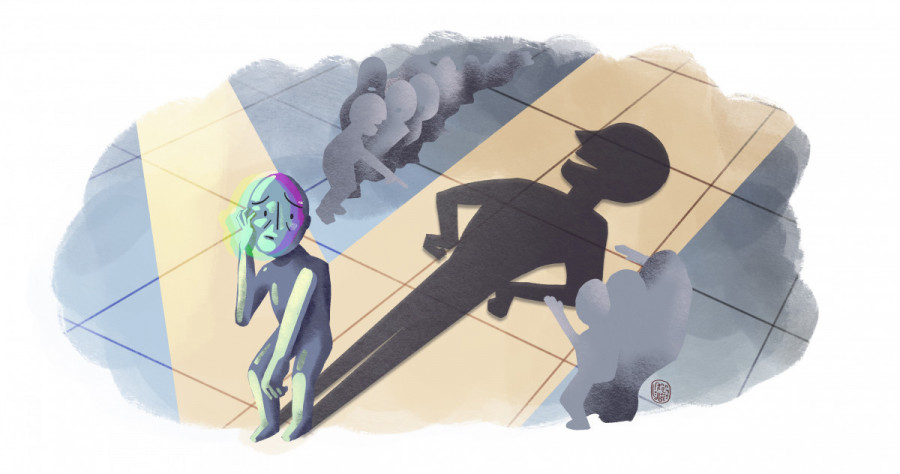Imposter Syndrome
With Lots of Reflection, Patience and Resilience, I Learned to Appreciate my Place in Society as a Black Woman
Every morning, I wake up, procrastinate, get out of bed, and slip into the clothes of the girl that is supposed to be me.
My monotonous morning routine unfolds with my eyes barely opened. There’s no time to live in the moment, I might miss my eight o’clock bus.
Whether the destination is school or work, an overwhelming sensation of pseudo-existence takes control and shifts my feet one at a time. I know where I’m going, but I’m not convinced I deserve to be there.
I navigate the world in a zombie-like state, afraid that other people will notice me for all the wrong reasons. Since I stick out like a sore thumb, the only thing I do feel is completely unqualified and out of place. This feeling, of being an outsider in the very room you worked hard to get into, is Imposter Syndrome.
Merriam-Webster defines Imposter Syndrome as the “persistent doubt concerning one’s abilities or accomplishments accompanied by the fear of being exposed as a fraud despite evidence of one’s ongoing success.”
Growing up, I’d always been one of the only Black girls in my schools. I remember hearing the term ‘angry Black girl’ for the first time and developing this fear of people having a reason to say something bad about me. I had set this unattainable standard of perfection and composure, to the point that I transformed into my own biggest critic.
Every moment of success was plagued by the feeling of inadequacy, and I was never able to accept that I could belong anywhere except at the bottom of the social hierarchy. That was when I understood that I was expected to fit a certain mold, despite how inauthentic and ill-fitting it would be.
Society has always had a negative view of Black women. It made me question whether or not I truly deserved all the good things that came my way. Whenever I was prompted to be my own best advocate, a wave of distrust would sweep below me and linger just long enough to induce panic. I carried this mentality with me throughout my entire life. I made sure to downsize every aspect of my personality just so that I could avoid any unwanted attention. But, as I avoided attention, I also fell into the habit of self-doubt.
A 2019 study conducted by the National Institute of Mental Health, a US government-funded biomedical and health research agency, found that 20 per cent of college students experience a sensation of significant doubt regarding their capabilities.
Many of us are all too familiar with this sense of doubt. We often find it nearly impossible to trust our own abilities, and fall into the comforting habit of biting our tongues out of fear of overstepping. Growing into your 20s during the pandemic was at best a jarring experience. All of a sudden, you’re meant to believe in yourself enough to set the path of the course of the rest of your life. Meanwhile, the last three years were nothing more than a blur and the concept of time has already caught up to you.
Time reminds us that it waits for no one, and before we even realize it, the defense of being young is no longer an excuse for our failures. It reminds us that we are now supposedly adults, with supposedly legitimate experiences, that are meant to serve us in our supposedly legitimate jobs. Unfortunately—whether we like it or not—Imposter Syndrome causes us to question our own qualifications, leaving us to be swallowed by feelings of anxiety.
Because of the pandemic, I never really got to experience that transition period reminding me that I’m not a kid anymore. I feel as though I never got the chance to acclimate to my new status as an adult in society. While I battle this internal exaggeration of every decision into a life-or-death situation, reality sets in. All of a sudden, every decision matters and every mistake matters even more.
A few months ago, I took my first leap into ‘the real world.’ I got hired for my first full-time job and the only thing I felt was sick to my stomach. I was the youngest person there, with no children to feed and no mortgage to pay. Because I had gotten so used to looking down on myself, I couldn’t help but question whether or not I deserved such an opportunity. While I battled this constant negative inner monologue—society’s prejudice against people of colour—I wondered how long I would be stuck in this cycle of anxiety.
Many people say that Imposter Syndrome never really goes away. Actor Lupita Nyong’o explained that despite her many bookings, the more she progresses in her career, the more she is filled with doubt. “I go through [Imposter Syndrome] with every role,” Nyong’o said. “I think winning an Oscar may in fact have made it worse,” she concluded.
As every minute passes, we always fear that we will soon be kicked to the curb, onto the sidewalk of the undeserving. The sidewalk where society tricks us into thinking we belong.
But instead of falling for that trick, try to view the discomfort as a sign of progress. Every new chapter in your life comes to you for a reason, and despite how daunting it can be, choosing to put your best foot forward can make all the difference. Imagine what would’ve happened if you had never taken that first breath the day you were born. If, at that life-changing moment, you had focused on the familiarity of the past, you would never have grown into the person you are today.
Here’s what I tell myself whenever I fall back into old habits of self-doubt: Don’t be the one to limit your own potential. Once you realize that you are the only one holding yourself back, you’ll notice that choosing to take that leap while afraid is always a better alternative to regretting your own inaction.
With lots of reflection, patience and resilience, I learned to appreciate my place in society as a Black woman. Despite the prejudice surrounding my people, I realized there was no need to fight so hard to prove people wrong. Living authentically—instead of striving for the unattainable—allowed me to develop a more trusting relationship with myself. I may not be perfect, but that’s completely okay.
If Imposter Syndrome’s grasp has ever held you back from believing in your own worth, and if you relate at all to the experiences I mentioned, make it your goal to combat these feelings of inadequacy head-on. Why let your insecurities decide your future? Do yourself a favour and let your potential and knowledge speak for itself.
This article originally appeared in Volume 43, Issue 13, published March 7, 2023.






